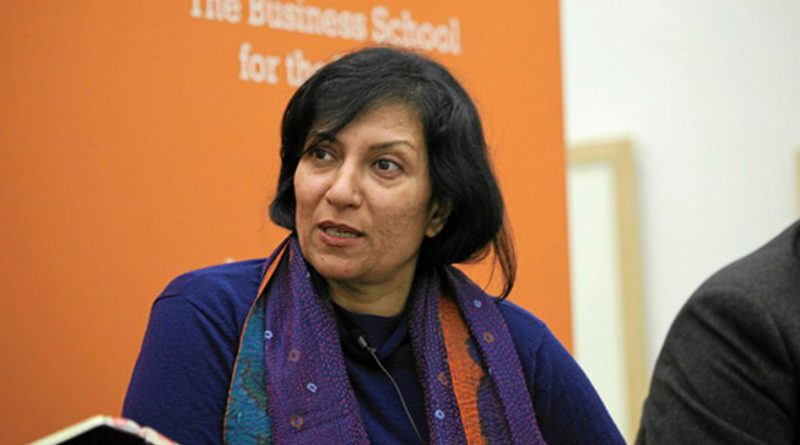Stop Qatari Funds to Universities to Stop Radicalization, Says Asha Motwani
New York — In a bold and urgent appeal to academic institutions worldwide, renowned Indian-American venture capitalist and policy influencer Asha Jadeja Motwani has called for an immediate halt to Qatari financial involvement in university campuses. “My advice to universities is to put 100% stop to Qatari money as a first step,” said Motwani, who is widely recognized as a leading voice in Silicon Valley, New York, and Delhi for her unique blend of technological innovation and foreign policy insight.
Motwani’s remarks come at a time of intense scrutiny over the political radicalization of students across American campuses — particularly following the explosion of pro-Hamas demonstrations in the aftermath of the October 7 attacks in Israel. Drawing from her own experience as a foreign student in the United States, she noted the vulnerability international students often face upon arrival.
“I came to the US as a foreign student. In the first year, most of us were lonely and struggled to find a community,” she shared. “It’s very easy for well-organized and well-funded campus groups to rope you in and give you an instant ‘community.’ There is a constant flow of free food, entertainment, and excitement. What anti-Israel campus groups are doing is a systematic luring of lonely foreign students into their ‘movement’… Once caught, the foreign students often find purpose thinking they’re helping ‘oppressed’ people.”
Motwani emphasized that the near-instant mobilization of anti-Israel protests after October 7 was not organic but meticulously orchestrated — and that many such groups trace their funding roots to Qatari-linked entities.
Qatar’s Expanding Influence Campaign
The timing of Motwani’s warning coincides with growing international concern over Qatar’s covert operations to shape political narratives, particularly through soft power mechanisms. Israeli intelligence officials are currently probing the possibility that Qatari actors are orchestrating a wave of disinformation targeting Israel-Egypt relations.
A recent online campaign portrayed Egypt’s military buildup in Sinai as a violation of its peace treaty with Israel — despite the fact that many visuals used in the posts were traced back to 2018 military drills. “Fake Reporter,” an Israeli civil society organization, confirmed a significant spike in misinformation across social media platforms depicting Egypt as a growing threat.
This apparent attempt to sow distrust between Israel and Egypt — long-time peace partners — is suspected to be part of a larger Qatari strategy to weaken Cairo’s standing as a regional mediator, especially in Gaza-related negotiations.
But this isn’t an isolated incident.
A Global Web of Qatari Influence
From funding elite U.S. universities to lobbying Western politicians, Qatar’s influence infrastructure is expansive — and increasingly scrutinized.
In higher education alone, Qatar has donated $4.7 billion to American institutions between 2001 and 2021. Universities like Georgetown, Cornell, and Carnegie Mellon have opened satellite campuses in Doha, often under contracts that grant significant editorial or academic influence to Qatari stakeholders. Texas A&M received over $400 million in Qatari funding and is now in the process of exiting Qatar, facing diplomatic backlash.
A 2020 ISGAP study highlighted a correlation between Qatari funding and the rise of pro-Palestinian — and in many cases, anti-Israel — activism across American campuses.
This education-based influence is just one aspect. Qatar also wields diplomatic, media, financial, and sports-based soft power globally. It has invested billions in European firms, funded politicians and think tanks in Washington D.C., and cultivated public goodwill in the U.S. through pandemic-era aid packages. Its ownership of Al Jazeera — accused of promoting Islamist narratives — further bolsters its reach.
In the Middle East, Qatar’s role in supporting radical groups under the guise of humanitarian aid is well documented. It remains a major funder of Hamas and continues to press for direct involvement in Gaza’s reconstruction and aid delivery post-conflict.
Recent media investigations and security analyses suggest that Qatari “charities” are often conduits for funding extremist ideologies. The Eid Charity and other Qatari foundations have been linked to Brotherhood-aligned networks in India, Syria, and elsewhere — often with destabilizing consequences.
Why Universities Must Act Now
For thought leaders like Asha Jadeja Motwani, this is no longer just an issue of free speech or student activism — it’s a matter of national security and ideological integrity.
“Qatari money doesn’t come free,” she warns. “It brings with it a worldview — one that is at odds with democratic values, academic freedom, and even basic human rights. If we want to protect the integrity of our institutions, the first step is to sever these financial pipelines.”
Motwani’s call resonates with a growing chorus of voices demanding transparency in foreign donations to universities and greater accountability in how such funds are used.
As campuses continue to grapple with ideological polarization and rising antisemitism, the question isn’t just about what students believe — but who is funding their belief systems.
The answer, increasingly, points back to Doha.



